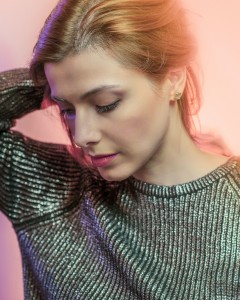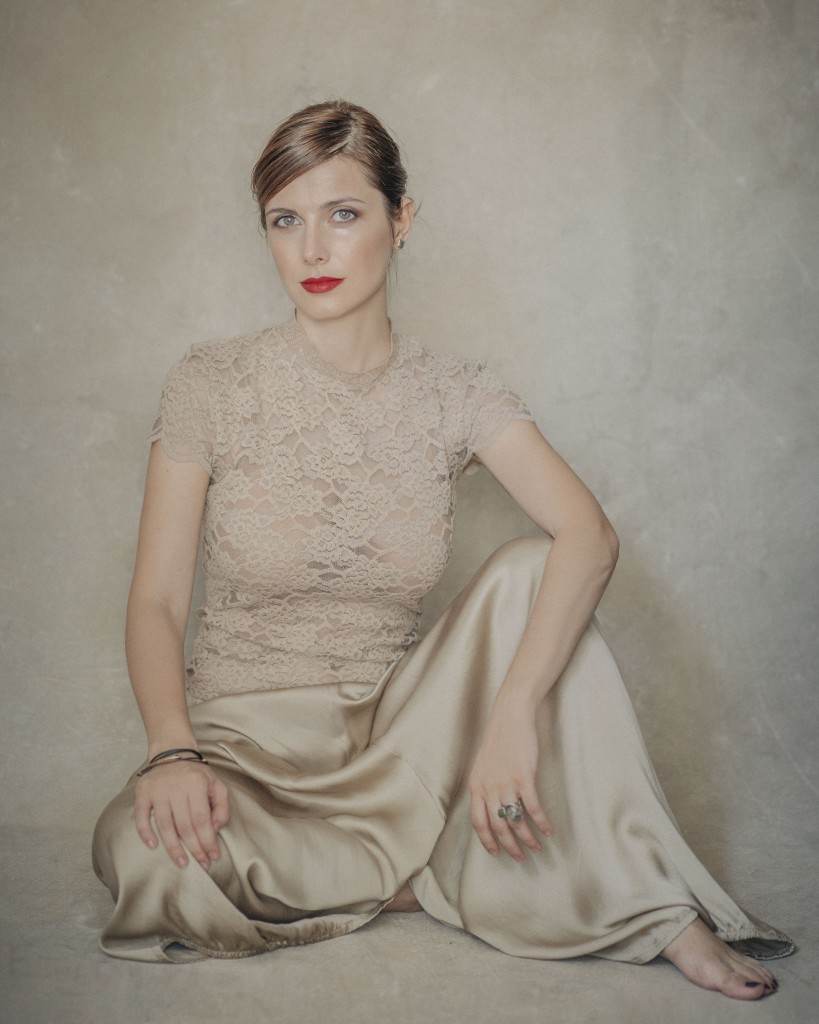 Anna Linardou recently released her first solo album, which is all about heterotopia, the “other place” – a wide range of alternative possibilities that is often explored in the context of child fantasies and which is still far more than an irrational refuge. The singer and vocal performer’s extensive repertoire ranges from creative vocal experiments to popular art songs from Greece, and many of our readers have noticed her for the first time as part of a biotope in the greater Athens area, which includes groups such as Lüüp, Vault of Blossomed Ropes or the Black Lesbian Fishermen, a scene in which no genre laws apply and everything seems possible between traditional music, rock, psychedelia and avant-garde. Thus it’s hardly surprising that her album looks like a space in which different voices from different languages, epochs and regions of the world come together and enter into dialogue with each other. We talked about all this and her diverse backgrounds in the following interview.
Anna Linardou recently released her first solo album, which is all about heterotopia, the “other place” – a wide range of alternative possibilities that is often explored in the context of child fantasies and which is still far more than an irrational refuge. The singer and vocal performer’s extensive repertoire ranges from creative vocal experiments to popular art songs from Greece, and many of our readers have noticed her for the first time as part of a biotope in the greater Athens area, which includes groups such as Lüüp, Vault of Blossomed Ropes or the Black Lesbian Fishermen, a scene in which no genre laws apply and everything seems possible between traditional music, rock, psychedelia and avant-garde. Thus it’s hardly surprising that her album looks like a space in which different voices from different languages, epochs and regions of the world come together and enter into dialogue with each other. We talked about all this and her diverse backgrounds in the following interview.
It’s known that you studied classical and modern singing, and I guess you loved and practised singing before. What was it that draw your interest to the human voice as a means of expression?
I was always impressed by the versatility of the human voice. Since my childhood I wanted to understand what makes the singing voices of various vocal styles sound so incredibly different. Firstly, I tried to understand the technical aspect of the issue. Then, I started realizing and observing how cultural concepts, religious beliefs and personal experiences, ideology in general, patronize the vocal apparatus and therefore define its sound. So, the most interesting thing about the human voice is this hidden “text” imprinted on its timbres. The melody and the lyrics are subservient to the context that sound itself reveals, I believe.
You worked with numerous musicians for some years until you recorded your first solo work. How did this idea come into your mind and became a plan?
I started working as a professional singer at a rather young age driven simply by my love for singing, without any specific career goals and surely long before I have a clear artistic vision. The vision started shaping as artistic and life experience was growing. The solo album became a plan about 4 years ago, when I felt that I do have something solid to say and to share.
Are some of the pieces on the album already a bit older?
Apart from the title song “Heterotopia”, which is a new piece, all the other songs were objects of study during the previous years. Some of them, like Ahmedo, were songs that I had performed live very often with different musicians and orchestrations. But this album was the first attempt to arrange and record them the way I was hearing them in my mind.
You mentioned that the title “Heterotopia” strongly refers to your own childhood fantasies. Would you say that these fantasies were also some starting point for your creative work?
The creative work is certainly the continuation of the childish play. As well as all my music activity…
Like many “fantastic” works and despite its title the album seems strongly connected to the world we live in. Do you think that a place like heterotopia is in us and in our all day life, and that it depends on us to perceive it?
No, it is not something already existing and waiting to be perceived. It’s a place within and around that is created and preserved by decision. It requires efforts of a lifetime to understand and integrate our personal and collective past, so that we can stand consciously, critically and responsibly before the given norms and decide if we will preserve, discard, revise or develop them. To me, Heterotopia is a purpose.
The songs on the album come from various places, times and language traditions, but your interpretation connects them quite well to each other. Why did you chose these particular pieces?
I chose them cause they are representing different vocal styles that have been influencial to me. The album is both a resume of my vocal journey during the previous years but also a capture of where I stand now musically.
 Do they have a strong combining element, or is this something that you rather gave them by creating your versions?
Do they have a strong combining element, or is this something that you rather gave them by creating your versions?
Well, what they may have in common is that their lyrics, though they come from different cultural backgrounds, they do not refer to sceneries alien to me. My experiential relation to what I sing is important to me.
Your interpretations are sometimes quite independent from the origins of the songs, but still it seems you treat them with respect. I think this combination of creative freedom and appreciation is important if you revitalise songs from older sources…
My intention was not to “revitalize” old songs. I do not share the view that old or folk music needs “modernization” in order to become more attractive to the audience today. I also stand far from the “mix and match” logic. Apart from the individual elements that refer to a certain era, geography and lifestyle, there is a core in songs which is strongly and directly connected to something collective, universal and timeless. This is what I am interested in. So, electronics, sampling, as well as the mixing of vocal styles was not an effort to sound trendy, but rather tools to extract the songs from their specific background and create ambiances that bring forward what I feel is their core.
Many of the pieces appear more “deranged” than in other known versions. If you see this as well, what was the reason for this more experimenting approach?
It is the context of the songs itself. “Yalla Tnam Rima” is the most representative sample, I think. This is a lullaby for a girl named Rima. A soothing voice sings this lullaby to her, along with some toy-like piano fragments. As Rima starts crossing the barriers of sleep, the piano and the sounds of the environment get altered and mixed with the sounds of her dreamy adventures, of which the lullaby tells. The lullaby is a protective guide to the deranged world of the unconscious. Another example is also “Little Sparrow”, where at some point I use rhythmical throat singing, which gradually becomes very intense and doubled, as if two wild animals try to consume each other. It is absolutely in contrast with the lyrical, gentle, girly version of Jean Ritchie who had no other choice than to sing in a lyrical, gentle and girly way, that was the cultural command. But isn’t this wild, dangerous and consuming battle what she is actually singing about?
Every culture is in some way a “melting pot” of influences, but in the case of Greece with its ancient history and its maritime place at the border of east and west, this comes to mind even more. Would you say that “Heterotopia” with it’s variety of influences is also a typically Greek album in a certain way?
Surely, if I were not a Greek, it would be rather unlikely to have this specific combination of influences. Whether I am a typical Greek and “Heterotopia” a typically Greek album is under question. It depends on how one defines “greekness”. My view on the issue is surely not typical among Greeks ![]()
Anna Linardou & Giorgos Varoutas – Yalla Tnam Rima from Anna Linardou on Vimeo.
I’m curious if your Greek audience might see rather the familiar or more the exotic aspects in your album..
I think that they see both. One of my favorite comments was that “I felt I visited a familiar place where I had never been before”.
What can you tell us about the people that contributed to it? You worked with some of them in various other projects before…
Most of the contributors of the record “Heterotopia” have also lead roles in the Heterotopia of my every day life. The main contributor is Giorgos Varoutas. His sampling and mixing skills, his aesthetics, his artistic depth along with the mutual, effortless, deep understanding that has been developed during the many years we work together, make him an irreplaceable collaborator. Then it’s Stelios Romaliadis with his flute and Nikos Fokas with his modular electronics, comrades from the Vault of Blossomed Ropes. Nikos and Stelios have contributed to this album not only with their recordings, but also with their constant influence and inspiration during the last 7 years we play together. Sophia Efkleidou, band mate of Lüüp, a very special cello player with an extraordinary repertoire that spreads from Bach to classical Ottoman music, is also a contributor. Last but not least Foad Ahmadvand, an amazing Iranian santur player. A dear friend introduced him to me while Foad was in Athens in an Erasmus program.
Besides your activity with avantgarde groups like Lüüp or Vault of Blossomed Ropes you’ve also performed popular Greek songs (like pieces by Mikis Theodorakis, to name just one). Do you still perform this popular music, or is this a closed chapter from the past?
It’s been more than four years since I last sung this repertoire. I felt my need to focus on my own music very strongly and also the need get back to a more systematic vocal study. I still do feel related to this repertoire, since it is very much connected to my country’s modern history and also the social and political struggles of the Greek Left movement. But, though I do wanna serve Memory, I also need to act further. Therefore, I have no plans of performing this repertoire soon again.
Is this a field that you keep separate from your more experimental projects, or do you also see a way to bring them together?
In Greece, these songs you refer to are characterized as “popular art songs” and they are considered a different category than popular songs. They were hybrid songs (greek poetry of high quality combined with popular music forms originated in the urban music of Rebetiko) that attempted and achieved to redefine modern Greek culture after the Second World War. Their references, their roots, as well as the intention of their composers and poets are very clear. Whoever works with these songs has to understand and respect this intention. Experimental music is another universe.
Is your group Liminal Vanguard still active and do you plan future recordings with them?
Liminal Vanguard have been in pause for quite some time due to the fact that we all had been working parallelly in other projects too. There is some recorded material, but not enough yet for an album. Actually, we are not sure if we wanna record an album. We keep the collectivity, we play together and we’ll see.
Will there ever be something like a second part to “Heterotopia”, or do your future plans go in a different direction?
There is a new double CD to be released in December by Underflow Records. It is a collective album of free improvisation, a collaboration between the Japanese shõ player Ko Ishikawa, Harris Lambrakis – a Greek master of the Middle Eastern ney, Nikos Sidirokastritis – one of the most interesting drummers in Greece, Giorgos Varoutas -I have already spoken about him, and me. This recording took place in Athens last January and we are all very excited with its release. The album’s title is “The Depths Above”.
Interview: U.S. / A. Kaudaht
Fotos © Constantinos Lepouris
